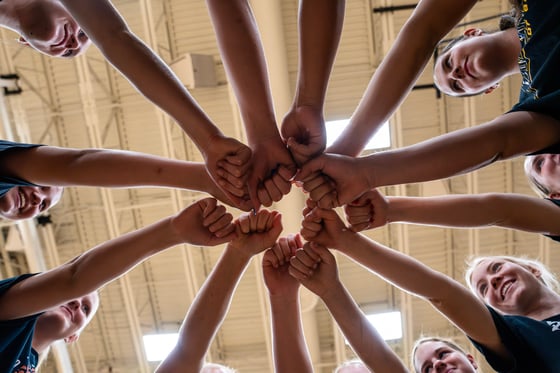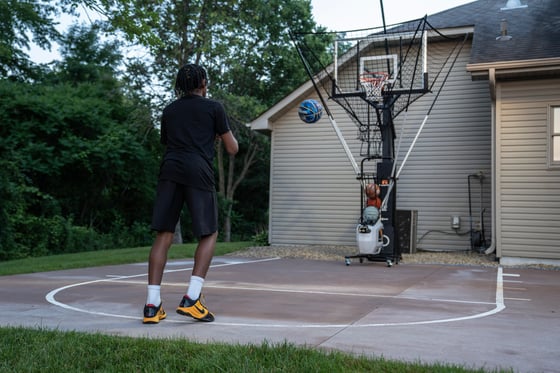7 Ways to Balance Playing Multiple Sports as a Basketball Player
Being a young athlete is a busy time - especially while you're trying to balance sports, school, personal relationships, and everything in-between. This is especially amplified while playing multiple sports.
While there is a tremendous benefit to getting involved in a variety of different athletic teams, it can also take away from valuable off-season practice time and reps it takes to be an elite basketball player. So how do you do it?
Here's 7 ways you can balance playing multiple sports even if your primary one is basketball.

1. Play Multiple Sports!
While this may seem a little counter-intuitive to the article, we still advise every young athlete to get involved in at least one other sport. This is a great way to broaden your athletic profile, whether it's getting faster in track, improving hand-eye coordination in baseball, or improving mental and physical toughness from football - it's all extremely beneficial to support your basketball journey.
Plus, it's a great way to branch out from your traditional basketball friendships, and increase your social circle with other people who have some of your shared interests.
2. Always Find a Sliver of Time for Extra Reps
While it may be difficult sometimes, especially after long day of school and practice for other sports, always try to find at least 15 minutes in the day were you're putting shots up (A Dr. Dish Home makes this easier!), getting some type of skillwork in, or just studying the game.
The elite players always find a way to keep basketball central in their life!

3. Have Dedicated Basketball Training Days in the Off-Season
Something that's beneficial for every athlete is to have structure to their week. And when you can plan out activities before they happen, it oftentimes makes the day a bit easier to account for. So, If you know you don't have practices on certain nights, that's probably the best time to get a full training session in.
4. Prioritize Rest and Recovery
While you should have dedicated basketball training days, you should also prioritize rest and recovery, especially if you are feeling burnt out from any of your previous sessions.
So if you have two free nights out for the week, maybe one of those is a dedicated basketball training session, and the other is a rest and recovery day. Prioritize low-impact activities and make sure you're getting adequate time hanging with your friends and working on your relationships. That recharges you to come back stronger the next day!
5. Communicate with Your Coaches
Schedules are crazy, and when you're a coach trying to get countless numbers of players back in the gym or training in the off-season, it can get a little hectic. Make sure you clearly communicate with your coach what priorities you have, and how you are still going to find the time get valuable reps in.
On the other side of the coin, make sure you're dedicating ample amount of time to your current sport, your teammates are depending on you to be locked in and focused on winning in the moment as well.
6. Use Your Secondary Sport to Support Your Basketball Goals
Every sport you play can be a tool to make you a better basketball player. Think about what skills transfer: football might build toughness and agility, soccer can improve conditioning and footwork, and track can increase speed and explosiveness. Instead of viewing your secondary sport as a distraction, see it as a complementary piece to your basketball development. Approach practices and games with the mindset of sharpening tools that will carry over onto the court.
7. Fuel Your Body the Right Way
Balancing multiple sports, school, and life takes a lot of energy, so how you fuel yourself matters. Prioritize eating balanced meals with enough protein, carbs, and healthy fats to keep you energized throughout the day. Staying hydrated and getting consistent sleep are just as important as your workouts. If you treat your body like an elite athlete—fueling it with the right foods and rest—you’ll perform better, recover quicker, and avoid burnout or injury.
If you're looking for any inspo, checkout our FREE In-Season Strength and Nutrition Guide!
- Basketball Drills (440)
- Basketball Shooting Drills (228)
- Basketball Shooting Machine (223)
- Dr. Dish (194)
- Basketball Coaching (158)
- Coach Tony Miller (113)
- Basketball Tips (102)
- Team Drills (98)
- Dr. Dish CT (97)
- College Basketball (87)
- Basketball Training (77)
- Off-Season (70)
- Dr. Dish Success Stories (66)
- Dr. Dish Home (64)
- High School Basketball (56)
- Skill Builder (56)
- Women's Basketball (43)
- Drill of the Week (40)
- Division 1 (38)
- NBA (38)
- Coach Mason (36)
- Player Development (36)
- Basketball Quotes (33)
- Youth Basketball Drills (30)
- Ball Handling (28)
- Basketball Training Equipment (27)
- Coaching Philosophy (27)
- Success Stories (26)
- WNBA (25)
- Mental Training (24)
- Basketball Event (21)
- Basketball Practice Plan (19)
- NCAA (19)
- Training Management System (19)
- Basketball Clinics (18)
- FCLTY (18)
- At Home Training (17)
- Europe (17)
- Players App (17)
- Ryan Razooky (17)
- Team Inspiration (17)
- FIBA drills (16)
- Giveaway (16)
- Maximize Your Season (16)
- Positionless Basketball (16)
- Basketball Camp (15)
- CT+ (15)
- Fundamentals (14)
- Interview (14)
- Jordan Lawley (14)
- iC3 Shot Trainer (14)
- Basketball Fundraising (13)
- AAU (12)
- All-Star+ (12)
- Basketball Post Drills (12)
- Be Better Everyday (12)
- Girls Basketball (12)
- Joe Abunassar (12)
- Skylar Diggins-Smith (12)
- FIBA (11)
- Special Jennings (11)
- Jake Rauchbach (10)
- March Madness (10)
- Motivation (10)
- Shane Hennen (10)
- Trainers (10)
- Cameron Brink (9)
- Debbie Antonelli (9)
- John Townsend (9)
- Kyle Travis (9)
- Louisville (9)
- Mindfulness (9)
- New 2022 Features (9)
- Pure Sweat (9)
- Bjorn Broman (8)
- FastModel (8)
- Milwaukee (8)
- Press Release (8)
- Zia Cooke (8)
- Byron Scott (7)
- DJ Sackmann (7)
- Lindsay Whalen (7)
- Rebel+ (7)
- Culture (6)
- D1 Drills (6)
- EuroLeague (6)
- Midwest 3 on 3 (6)
- Multiplayer Mode (6)
- summer of better (6)
- Boys Basketball (5)
- Dish Lab (5)
- Dr. Dish vs The Gun (5)
- Florida Gators (5)
- Mike Dunn (5)
- Mike Lee (5)
- Pat the Roc (5)
- Q&A (5)
- Special Olympics (5)
- UNLV (5)
- Allie Quigley (4)
- Amy Hunt Home Business Expert (4)
- Greg Stiemsma (4)
- Luka Doncic (4)
- Mentorship (4)
- Train For Next (4)
- Virtual Camp (4)
- 5-Out Offense Actions (3)
- All In (3)
- Athletic Directors (3)
- Basketball Recruiting (3)
- Catalyst Training (3)
- Greece (3)
- Holidays (3)
- Push Beyond (3)
- Spencer Levy (3)
- Strength Training (3)
- Trade-In Program (3)
- preseason (3)
- Analytics (2)
- Assembly (2)
- Dr. Dish TV (2)
- Duke University (2)
- Eurohoops (2)
- Final 4 (2)
- France (2)
- George "Gee" Gervin Jr. (2)
- HCTC (2)
- Head Coach Training Center (2)
- Mathieu Delarche (2)
- Maurice Riddick (2)
- Midwest Basketball Training (2)
- Moris Hadzija (2)
- NBA All-Star Weekend (2)
- NWBA (2)
- Professional Development (2)
- Small Sided Game (2)
- Tyty Washington (2)
- jrue holiday (2)
- post season (2)
- Accessories (1)
- Australia (1)
- Basketball Training Machine (1)
- Brett Brown (1)
- Carlos Frade (1)
- Championship Guide (1)
- Chris Johnson (1)
- Courts of the World (1)
- Curro Segura (1)
- Customer Success (1)
- Dimitri Lauwers (1)
- Father's Day (1)
- Hoops Factory (1)
- Jaume Comas (1)
- Jesus Lazard (1)
- Joerik Michiels (1)
- Knockdown (1)
- Leadership (1)
- National Night Out (1)
- National Teams (1)
- Offline Mode (1)
- Rising Coaches (1)
- Shot Trainer (1)
- Sports Boosters (1)
- Statistics (1)
- Switzerland (1)
- Tony Delk (1)
- Tutorial (1)
- Wheelchair Basketball (1)
- affordable (1)
- endorsement (1)
- green light (1)
- spain (1)
- February 2026 (5)
- January 2026 (3)
- December 2025 (3)
- November 2025 (8)
- October 2025 (7)
- September 2025 (9)
- August 2025 (19)
- July 2025 (20)
- June 2025 (24)
- May 2025 (11)
- April 2025 (6)
- March 2025 (12)
- February 2025 (6)
- January 2025 (6)
- December 2024 (14)
- November 2024 (13)
- October 2024 (16)
- September 2024 (12)
- August 2024 (13)
- July 2024 (9)
- June 2024 (7)
- May 2024 (10)
- April 2024 (12)
- March 2024 (15)
- February 2024 (10)
- January 2024 (10)
- December 2023 (7)
- November 2023 (9)
- October 2023 (14)
- September 2023 (18)
- August 2023 (10)
- July 2023 (9)
- June 2023 (20)
- May 2023 (10)
- April 2023 (8)
- March 2023 (14)
- February 2023 (8)
- January 2023 (12)
- December 2022 (13)
- November 2022 (9)
- October 2022 (11)
- September 2022 (12)
- August 2022 (14)
- July 2022 (18)
- June 2022 (18)
- May 2022 (16)
- April 2022 (16)
- March 2022 (19)
- February 2022 (14)
- January 2022 (10)
- December 2021 (20)
- November 2021 (14)
- October 2021 (19)
- September 2021 (16)
- August 2021 (14)
- July 2021 (16)
- June 2021 (17)
- May 2021 (18)
- April 2021 (15)
- March 2021 (19)
- February 2021 (15)
- January 2021 (20)
- December 2020 (12)
- November 2020 (15)
- October 2020 (15)
- September 2020 (15)
- August 2020 (13)
- July 2020 (14)
- June 2020 (17)
- May 2020 (14)
- April 2020 (13)
- March 2020 (9)
- February 2020 (11)
- January 2020 (11)
- December 2019 (11)
- November 2019 (7)
- October 2019 (11)
- September 2019 (16)
- August 2019 (13)
- July 2019 (9)
- June 2019 (10)
- May 2019 (11)
- April 2019 (7)
- March 2019 (9)
- February 2019 (7)
- January 2019 (6)
- December 2018 (13)
- November 2018 (11)
- October 2018 (12)
- September 2018 (13)
- August 2018 (15)
- July 2018 (10)
- June 2018 (6)
- May 2018 (7)
- April 2018 (7)
- March 2018 (8)
- February 2018 (6)
- January 2018 (7)
- December 2017 (8)
- November 2017 (9)
- October 2017 (9)
- September 2017 (5)
- August 2017 (9)
- July 2017 (10)
- June 2017 (11)
- May 2017 (6)
- April 2017 (6)
- March 2017 (12)
- February 2017 (10)
- January 2017 (15)
- December 2016 (12)
- November 2016 (13)
- October 2016 (12)
- September 2016 (10)
- August 2016 (10)
- July 2016 (8)
- June 2016 (5)
- May 2016 (4)
- April 2016 (8)
- March 2016 (9)
- February 2016 (7)
- January 2016 (6)
- December 2015 (8)
- November 2015 (3)
- October 2015 (1)
- September 2015 (1)
- August 2015 (2)
- June 2015 (1)
- May 2015 (4)
- April 2015 (1)

